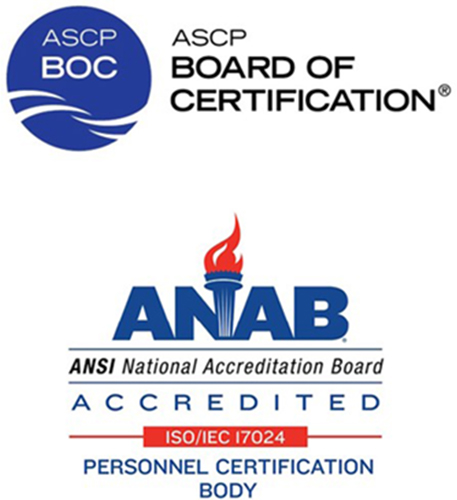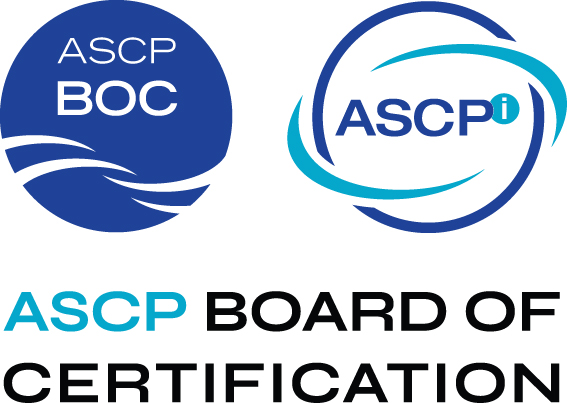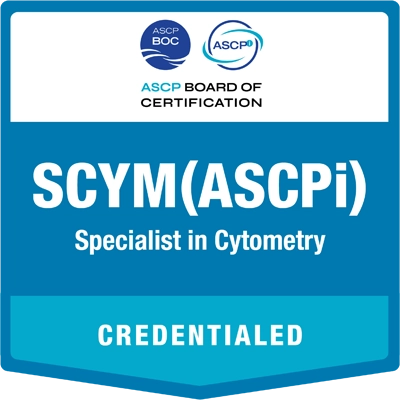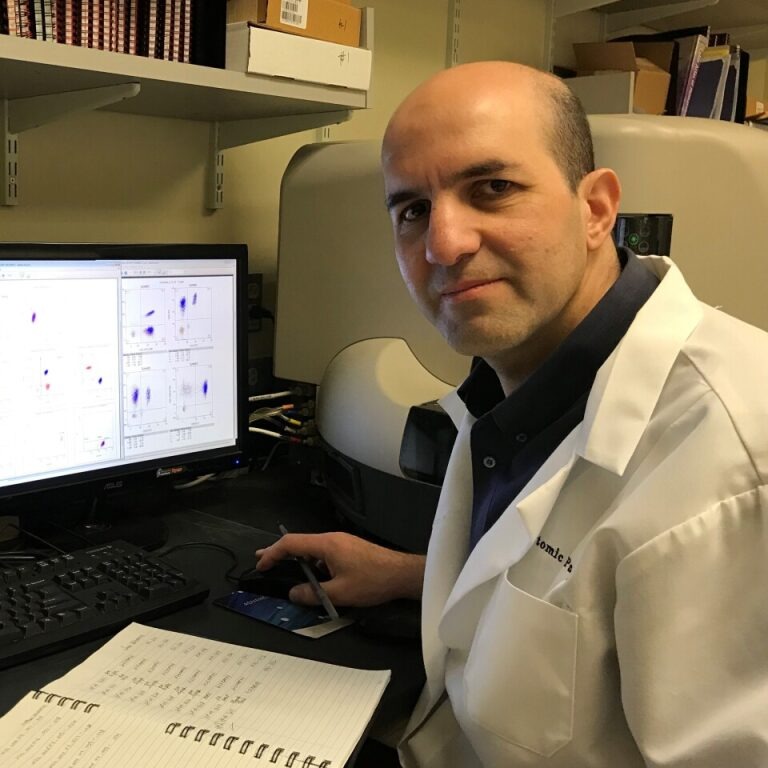Obtain certification and advance your career in cytometry with our specialized credential.
Knowledgeable in all aspects of flow cytometry. Performs and/or oversees flow cytometry assays in clinical, research or reference laboratories. Able to lead the development, validation, and implementation of new assays. Proficient in all aspects of flow cytometry including technical, quality, and regulatory issues. Specialists have advanced knowledge, skills, and abilities; they serve as leaders, educators, and advisors within their specialty area.
Attaining an American Society for Clinical Pathology Board of Certification (ASCP BOC) credential requires a laboratory professional or other expert to meet specific education, training, and/or experience standards and to successfully pass an examination demonstrating knowledge and applied skills. The ASCP BOC offers ASCP and ASCPi credentials based on distinct eligibility requirements. All candidates must carefully compare credentialing options. Additional information is available about the similarities and differences between ASCP and ASCPi credentials.
Each credential has specific eligibility requirements, which are different for ASCP and ASCPi. It’s your responsibility to confirm that your education, training, and/or experience meet the criteria. Submit the correct documentation with your application. Once submitted, the category and route of application cannot be changed.
Check Your EligibilityAn applicant must be able to verify that they meet all eligibility requirements, including education, training, and/or experience. For complete information, see the Documentation section of the website.
Education does not need to be from the United States. Details are available by reviewing the webpage titled Acceptable Education, also available in the routes below.
To be eligible for this examination category, an applicant must satisfy the minimum requirements (for degrees, the stated degree or higher) of at least one of the following routes:
An applicant must be able to verify that they meet all eligibility requirements, including education, training, and/or experience. For complete information, see the Documentation section of the website.
Education needs to be equivalent to education from the United States. Details are available by reviewing the webpage titled Acceptable Education, also available in the routes below.
To be eligible for this examination category, an applicant must satisfy the minimum requirements (for degrees, the stated degree or higher) of at least one of the following routes:


Baccalaureate degree from an accredited (regionally or nationally) college/university with a major in biological/life science, physics, engineering, or an appropriately related field, OR a baccalaureate degree from an accredited regionally accredited college/university with a combination of 30 semester hours (45 quarter hours) in biology, chemistry, and/or physics, which may be obtained within, or in addition to, the baccalaureate degree,
AND 4 years of full-time acceptable clinical* experience in a flow cytometry^ laboratory OR 4 years of full-time acceptable research, industry, or veterinary experience in a flow cytometry^ laboratory in the U.S. or Canada. These 4 years of experience must be within the last 8 years and must be documented on this Experience Documentation Form.
*Acceptable Clinical Laboratory:
CMS CLIA certificate of registration, compliance, accreditation;
OR DoD CLIP certificate of registration, compliance, accreditation;
OR JCI accreditation;
OR Accreditation under ISO 15189.
^A flow cytometry laboratory is defined as one capable of providing individuals with knowledge and practical experience in flow cytometry including sample processing, data acquisition, data analysis, quality assurance/control, instrument operation, and laboratory operations/management.
Experience
To fulfill the experience requirements for the Specialist in Cytometry, you must have experience in flow cytometry applications, cytometric analysis, and quality assurance as described below.
Flow Cytometry Applications
Experience is required in at least one of the following:
Cytometric Analysis
Experience is required in at least three of the following:
Quality Assurance
Experience is required in at least three of the following:
Valid ASCP scientist or specialist certification,
AND a baccalaureate degree from an accredited (regionally or nationally) college/university,
AND 3 years of full-time acceptable clinical* experience in a flow cytometry^ laboratory OR 3 years of full-time acceptable research, industry, or veterinary experience in a flow cytometry^ laboratory in the U.S. or Canada. These 3 years of experience must be within the last 6 years and must be documented on this Experience Documentation Form.
*Acceptable Clinical Laboratory:
CMS CLIA certificate of registration, compliance, accreditation;
OR DoD CLIP certificate of registration, compliance, accreditation;
OR JCI accreditation;
OR Accreditation under ISO 15189.
^A flow cytometry laboratory is defined as one capable of providing individuals with knowledge and practical experience in flow cytometry including sample processing, data acquisition, data analysis, quality assurance/control, instrument operation, and laboratory operations/management.
Experience
To fulfill the experience requirements for the Specialist in Cytometry, you must have experience in flow cytometry applications, cytometric analysis, and quality assurance as described below.
Flow Cytometry Applications
Experience is required in at least one of the following:
Cytometric Analysis
Experience is required in at least three of the following:
Quality Assurance
Experience is required in at least three of the following:
Master’s degree from an accredited (regionally or nationally) college/university in biological/life science, physics, engineering, or an appropriately related field,
AND 3 years of full-time acceptable clinical* experience in a flow cytometry^ laboratory OR 3 years of full-time acceptable research, industry, or veterinary experience in a flow cytometry^ laboratory in the U.S. or Canada. These 3 years of experience must be within the last 6 years and must be documented on this Experience Documentation Form.
*Acceptable Clinical Laboratory:
CMS CLIA certificate of registration, compliance, accreditation;
OR DoD CLIP certificate of registration, compliance, accreditation;
OR JCI accreditation;
OR Accreditation under ISO 15189.
^A flow cytometry laboratory is defined as one capable of providing individuals with knowledge and practical experience in flow cytometry including sample processing, data acquisition, data analysis, quality assurance/control, instrument operation, and laboratory operations/management.
Experience
To fulfill the experience requirements for the Specialist in Cytometry, you must have experience in flow cytometry applications, cytometric analysis, and quality assurance as described below.
Flow Cytometry Applications
Experience is required in at least one of the following:
Cytometric Analysis
Experience is required in at least three of the following:
Quality Assurance
Experience is required in at least three of the following:
Doctorate from an accredited (regionally or nationally) college/university in biological/life science, physics, engineering, or an appropriately related field,
AND 2 years of full-time acceptable clinical* experience in a flow cytometry^ laboratory OR 2 years of full-time acceptable research, industry, or veterinary experience in a flow cytometry^ laboratory in the U.S. or Canada. These 2 years of experience must be within the last 4 years and must be documented on this Experience Documentation Form.
*Acceptable Clinical Laboratory:
CMS CLIA certificate of registration, compliance, accreditation;
OR DoD CLIP certificate of registration, compliance, accreditation;
OR JCI accreditation;
OR Accreditation under ISO 15189.
^A flow cytometry laboratory is defined as one capable of providing individuals with knowledge and practical experience in flow cytometry including sample processing, data acquisition, data analysis, quality assurance/control, instrument operation, and laboratory operations/management.
Experience
To fulfill the experience requirements for the Specialist in Cytometry, you must have experience in flow cytometry applications, cytometric analysis, and quality assurance as described below.
Flow Cytometry Applications
Experience is required in at least one of the following:
Cytometric Analysis
Experience is required in at least three of the following:
Quality Assurance
Experience is required in at least three of the following:
Baccalaureate degree from an accredited/approved* educational institution in biological/life science, physics, engineering, or an appropriately related field, OR a baccalaureate degree from an accredited/approved* educational institution with a combination of 30 semester hours in biology, chemistry, and/or physics, which may be obtained within, or in addition to, the baccalaureate degree,
AND 4 years of acceptable clinical# experience in a flow cytometry^ laboratory that must be documented on this Experience Documentation Form OR 4 years of acceptable research, industry, or veterinary experience in a flow cytometry^ laboratory that must be documented on this Experience Documentation Form.
*Accredited/approved by a governing regulatory association or Ministry. Countries without a prevalent system of accreditation/approval must have programs/educational institutions approved by an International Advisory Board appointed by the ASCP Board of Certification, or eligibility will be determined by an acceptable transcript evaluation. The foreign degree must be equivalent to a U.S. degree.
#Clinical laboratory accredited by JCI, CAP, under ISO 15189 or authorized by a governing regulatory association or Ministry. Countries without a prevalent system of accreditation must have laboratories approved by an International Advisory Board appointed by the ASCP Board of Certification.
^A flow cytometry laboratory is defined as one capable of providing individuals with knowledge and practical experience in flow cytometry including sample processing, data acquisition, data analysis, quality assurance/control, instrument operation, and laboratory operations/management.
Experience
To fulfill the experience requirements for the Specialist in Cytometry, you must have experience in flow cytometry applications, cytometric analysis, and quality assurance as described below.
Flow Cytometry Applications
Experience is required in at least one of the following:
Cytometric Analysis
Experience is required in at least three of the following:
Quality Assurance
Experience is required in at least three of the following:
Valid technologist/scientist (ASCP or ASCPi) or specialist (ASCP or ASCPi) certification,
AND a baccalaureate degree from an accredited/approved* educational institution,
AND 3 years of acceptable clinical# experience in a flow cytometry^ laboratory that must be documented on this Experience Documentation Form OR 3 years of acceptable research, industry, or veterinary experience in a flow cytometry^ laboratory on this Experience Documentation Form.
$Acceptable Clinical Laboratory:
CMS CLIA certificate of registration, compliance, accreditation;
OR DoD CLIP certificate of registration, compliance, accreditation;
OR JCI accreditation;
OR accreditation under ISO 15189;
OR CAP;
OR ASHI;
OR other laboratory accreditation approved by the Medical Laboratory Immunology Examination Committee.
#Clinical laboratory accredited by JCI, CAP, under ISO 15189 or authorized by a governing regulatory association or Ministry. Countries without a prevalent system of accreditation must have laboratories approved by an International Advisory Board appointed by the ASCP Board of Certification.
^A flow cytometry laboratory is defined as one capable of providing individuals with knowledge and practical experience in flow cytometry including sample processing, data acquisition, data analysis, quality assurance/control, instrument operation, and laboratory operations/management.
Experience
To fulfill the experience requirements for the Specialist in Cytometry, you must have experience in flow cytometry applications, cytometric analysis, and quality assurance as described below.
Flow Cytometry Applications
Experience is required in at least one of the following:
Cytometric Analysis
Experience is required in at least three of the following:
Quality Assurance
Experience is required in at least three of the following:
Master’s degree from an accredited/approved* educational institution in biological/life science, physics, engineering, or an appropriately related field,
AND 3 years of acceptable clinical# experience in a flow cytometry^ laboratory that must be documented on this Experience Documentation Form OR 3 years of research, industry, or veterinary experience in a flow cytometry^ laboratory that must be documented on this Experience Documentation Form.
*Accredited/approved by a governing regulatory association or Ministry. Countries without a prevalent system of accreditation/approval must have programs/educational institutions approved by an International Advisory Board appointed by the ASCP Board of Certification, or eligibility will be determined by an acceptable transcript evaluation. The foreign degree must be equivalent to a U.S. degree.
#Clinical laboratory accredited by JCI, CAP, under ISO 15189 or authorized by a governing regulatory association or Ministry. Countries without a prevalent system of accreditation must have laboratories approved by an International Advisory Board appointed by the ASCP Board of Certification.
^A flow cytometry laboratory is defined as one capable of providing individuals with knowledge and practical experience in flow cytometry including sample processing, data acquisition, data analysis, quality assurance/control, instrument operation, and laboratory operations/management.
Experience
To fulfill the experience requirements for the Specialist in Cytometry, you must have experience in flow cytometry applications, cytometric analysis, and quality assurance as described below.
Flow Cytometry Applications
Experience is required in at least one of the following:
Cytometric Analysis
Experience is required in at least three of the following:
Quality Assurance
Experience is required in at least three of the following:
Doctorate from an accredited/approved* educational institution in biological/life science, physics, engineering, or an appropriately related field,
AND 2 years of acceptable clinical# experience in a flow cytometry^ laboratory that must be documented on this Experience Documentation Form OR 2 years of acceptable research, industry, or veterinary experience in a flow cytometry^ laboratory that must be documented on this Experience Documentation Form.
*Accredited/approved by a governing regulatory association or Ministry. Countries without a prevalent system of accreditation/approval must have programs/educational institutions approved by an International Advisory Board appointed by the ASCP Board of Certification, or eligibility will be determined by an acceptable transcript evaluation. The foreign degree must be equivalent to a U.S. degree.
#Clinical laboratory accredited by JCI, CAP, under ISO 15189 or authorized by a governing regulatory association or Ministry. Countries without a prevalent system of accreditation must have laboratories approved by an International Advisory Board appointed by the ASCP Board of Certification.
^A flow cytometry laboratory is defined as one capable of providing individuals with knowledge and practical experience in flow cytometry including sample processing, data acquisition, data analysis, quality assurance/control, instrument operation, and laboratory operations/management.
Experience
To fulfill the experience requirements for the Specialist in Cytometry, you must have experience in flow cytometry applications, cytometric analysis, and quality assurance as described below.
Flow Cytometry Applications
Experience is required in at least one of the following:
Cytometric Analysis
Experience is required in at least three of the following:
Quality Assurance
Experience is required in at least three of the following:
Reduced pricing is available for those educated and residing in low-to-middle income countries.
You must upload the appropriate documentation form when you apply online, verifying that you meet the training and/or experience requirements for your category and route of application. You will also need to submit an acceptable transcript or transcript evaluation verifying that you meet the academic requirements. Gather your documents before submitting your application and application fee.
Once you have confirmed that you meet the requirements and have gathered your documents, submit your online application.
 |  |
In early 2026, the ASCP BOC will launch digital badging through Credly, a trusted provider that increases the visibility of ASCP BOC credential holders by securely showcasing and sharing professional credentials. Learn more about digital badges.
